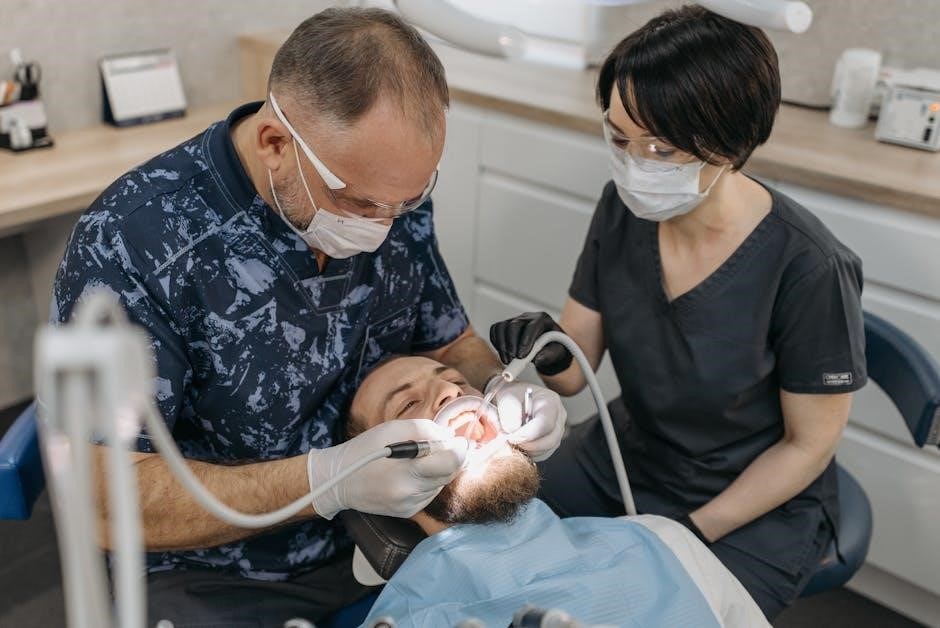The Peer Support Specialist Certification validates expertise in recovery support, empowering individuals to assist others in mental health and substance use recovery․ The practice exam PDF serves as a key resource for preparing for this certification, ensuring readiness to provide effective, trauma-informed care and Peer Support services․
Overview of the Peer Support Specialist Role
A Peer Support Specialist is an individual with lived experience in mental health or substance use recovery, or as a family member/caregiver, who provides support to others in their recovery journey․ They work in healthcare settings, such as hospitals, clinics, and community organizations, to empower individuals by sharing their personal insights and fostering hope․ Key responsibilities include building rapport, facilitating group sessions, and collaborating with care teams to promote recovery goals․ Specialists use techniques like motivational interviewing and trauma-informed care to create safe, non-judgmental environments․ Their role emphasizes crisis intervention, cultural humility, and self-care, making them vital in helping clients navigate their unique recovery paths effectively․
Importance of Certification for Peer Support Specialists
Certification as a Peer Support Specialist is crucial for validating expertise and ensuring high-quality care․ It signifies that specialists have met rigorous standards, enhancing their credibility and employability․ The certification process, often involving a practice exam PDF, ensures they understand recovery principles, communication skills, and cultural humility․ This credential also demonstrates a commitment to professional development and staying updated on best practices․ For employers, certification guarantees that specialists are well-prepared to support clients effectively․ It fosters trust and confidence among healthcare teams and clients, making it a vital step for anyone seeking to make a meaningful impact in recovery support․ Certification ultimately elevates the role of Peer Support Specialists in the healthcare system․

Structure of the Peer Support Specialist Practice Exam
The exam includes multiple-choice and short-answer questions, assessing knowledge of recovery principles, communication skills, and crisis intervention․ The practice exam PDF mirrors the actual test format․
Multiple-Choice Questions: Format and Approach
The multiple-choice section of the Peer Support Specialist Practice Exam evaluates your understanding of core recovery principles and support practices․ Each question presents four options, requiring you to select the most accurate answer․ The format tests your ability to apply knowledge in real-world scenarios․ Emphasizing critical thinking, questions cover topics like communication skills, crisis intervention, and cultural humility․ The practice exam PDF mirrors this format, helping you familiarize yourself with the structure and content․ Regular practice with these questions enhances your problem-solving skills and confidence․ Use the PDF to identify weak areas and refine your approach for the actual exam․
Short Answer Questions: Key Content Areas
Short answer questions in the Peer Support Specialist Practice Exam assess your ability to articulate key concepts and practices clearly․ These questions focus on core areas such as peer support principles, recovery processes, and crisis intervention strategies․ Candidates are expected to provide concise, accurate responses that demonstrate their understanding of trauma-informed care, cultural humility, and self-care practices․ The practice exam PDF includes sample short answer questions, allowing you to familiarize yourself with the format and content․ By practicing these questions, you can refine your ability to communicate effectively and address real-life scenarios confidently․ This section evaluates both knowledge and practical application, ensuring readiness for the certification exam․
Exam Duration and Total Number of Questions
The Peer Support Specialist Practice Exam typically lasts approximately 2․5 hours, during which candidates must answer a total of 120 multiple-choice questions․ This timeframe is designed to assess knowledge and practical application of peer support principles, recovery processes, and crisis intervention strategies․ The practice exam PDF mirrors this structure, helping candidates acclimate to the exam format and pacing․ Understanding the time constraints is crucial for effective preparation, as it requires balancing thorough thinking with timely responses․ Practicing under timed conditions, as outlined in the study guide, is highly recommended to enhance performance and confidence during the actual exam․
Passing Score and Grading Criteria
The passing score for the Peer Support Specialist Practice Exam is typically 70% or higher, depending on the certifying organization․ Candidates must correctly answer a predetermined number of questions to achieve this threshold․ The grading criteria focus on assessing comprehensive knowledge of peer support principles, recovery-oriented practices, and interpersonal skills․ The practice exam PDF provides a detailed scoring guide, helping candidates understand how their responses align with the required competencies․ By reviewing the grading criteria, individuals can identify areas for improvement and refine their test-taking strategies․ This ensures a focused and effective preparation process, ultimately enhancing their readiness for the actual certification exam․

Core Competencies Assessed in the Exam
The exam evaluates essential skills like peer support principles, effective communication, crisis intervention, cultural humility, and self-care practices, ensuring specialists can provide compassionate and effective support to individuals in recovery․
Peer Support Principles and Practices
Peer support principles emphasize shared experiences, empowerment, and mutual understanding to foster recovery․ The practice exam PDF assesses knowledge of recovery-oriented approaches, trauma-informed care, and person-centered support․ Key areas include lived experience, hope and resilience, and self-determination․ Specialists must demonstrate an understanding of how to build rapport and trust, facilitate goal-setting, and promote self-advocacy․ The exam also evaluates the ability to apply recovery principles in real-world scenarios, ensuring specialists can provide non-clinical support that aligns with the individual’s unique needs and preferences․ These principles are foundational to the peer support role and are critical for effective, meaningful connections with clients․
Effective Communication and Interpersonal Skills
Effective communication and interpersonal skills are essential for peer support specialists to build trust and rapport with clients․ This includes active listening, empathy, and the ability to convey understanding without judgment․ Specialists must use open-ended questions to encourage clients to share their experiences and avoid leading questions that may influence responses․ Affirmations, such as acknowledging strengths and progress, are also critical in fostering a supportive relationship․ The practice exam PDF emphasizes the importance of non-verbal communication, cultural sensitivity, and adaptability in interactions․ These skills enable specialists to connect meaningfully with diverse individuals, ensuring personalized and impactful support․ Mastery of these abilities is a cornerstone of successful peer support practice․
Crisis Intervention and Safety Protocols
Crisis intervention and safety protocols are critical skills for peer support specialists, ensuring they can respond effectively to emergencies․ The practice exam PDF covers strategies for assessing crisis situations, implementing de-escalation techniques, and maintaining safety for both clients and support teams․ Specialists must be adept at recognizing warning signs of escalation and intervening appropriately․ The exam also evaluates knowledge of emotional and psychological first aid, enabling specialists to provide immediate support during crises․ By mastering these protocols, peer support specialists can confidently navigate high-stress situations, ensuring the well-being of clients and themselves․ This competency is essential for building trust and fostering a safe recovery environment․ The practice exam helps reinforce these skills through real-world scenario-based questions․
Cultural Humility and Trauma-Informed Care
Cultural humility and trauma-informed care are essential competencies for peer support specialists, ensuring they provide inclusive and sensitive support․ The practice exam PDF assesses understanding of these concepts, emphasizing the importance of recognizing diverse experiences and avoiding assumptions․ Cultural humility involves self-reflection and openness to learning from clients’ unique backgrounds․ Trauma-informed care focuses on creating safe environments that acknowledge the impact of past traumas․ Specialists must demonstrate skills in adapting their approach to honor clients’ cultural identities and avoid triggering behaviors․ The exam includes scenarios that test the ability to apply these principles, ensuring specialists can foster trust and empowerment in recovery journeys․ These competencies are vital for ethical and effective peer support practice․
Self-Care and Boundary Setting for Specialists

Self-care and boundary setting are critical for peer support specialists to maintain their well-being while effectively supporting others․ The practice exam PDF evaluates understanding of these principles, emphasizing the importance of emotional resilience and professional limits․ Specialists must recognize signs of burnout and implement strategies to manage stress, such as mindfulness or seeking support networks․ Boundary setting involves maintaining clear distinctions between personal and professional relationships, ensuring ethical practice․ The exam includes questions on prioritizing self-care activities and establishing healthy boundaries without compromising client trust․ These skills are vital to sustain long-term effectiveness and personal health in the peer support role․

Study Materials and Resources
Official study guides, practice exams, and online courses provide comprehensive preparation for the Peer Support Specialist Practice Exam․ These resources help candidates master key concepts and strategies․
Official Study Guides for the Exam
Official study guides for the Peer Support Specialist Practice Exam are essential resources for candidates․ These guides provide detailed insights into the exam format, including multiple-choice and short-answer questions․ They cover key topics such as peer support principles, crisis intervention, and cultural humility․ Many guides include practice questions with answers, helping candidates assess their readiness․ The Medi-Cal Peer Support Specialist Exam, for instance, offers a study guide with 120 multiple-choice questions․ Additionally, resources like the CMPSS Certification Exam Preparation Guide outline core competencies and exam blueprints․ These guides are designed to help candidates understand the exam structure and focus on areas needing improvement․ Using official study guides ensures a comprehensive preparation for the certification exam․
Practice Exam Questions and Answer Keys
Practice exam questions and answer keys are vital tools for preparing for the Peer Support Specialist Practice Exam․ These resources provide candidates with a clear understanding of the exam format and content․ Many practice exams, such as the Medi-Cal Peer Support Specialist Exam, include 120 multiple-choice questions covering topics like recovery principles, crisis intervention, and cultural humility․ Answer keys offer explanations for correct and incorrect responses, helping candidates identify areas for improvement․ Platforms like Quizlet and Docsity provide additional practice tests, enabling candidates to assess their readiness․ Utilizing these resources ensures familiarity with the exam structure and enhances confidence in answering questions effectively during the actual test․ Regular practice with these materials is highly recommended for successful certification․
Online Courses and Webinars for Preparation
Online courses and webinars are essential resources for preparing for the Peer Support Specialist Practice Exam․ Platforms like Goodwill and MHA offer certification courses that cover core competencies such as recovery principles, crisis intervention, and cultural humility․ These courses often include interactive modules, live sessions, and downloadable materials․ Webinars provide insights into test-taking strategies and real-world applications of peer support skills․ Many programs, such as those offered by Quizlet and Docsity, include practice exams and study guides to reinforce learning․ These online resources allow candidates to prepare at their own pace, ensuring a comprehensive understanding of the exam content and improving their readiness for certification․ They are particularly beneficial for those balancing other commitments while pursuing certification․
Recommended Reading and Reference Materials
Several recommended reading and reference materials are available to aid in preparing for the Peer Support Specialist Practice Exam․ Key resources include official study guides, which provide a comprehensive overview of peer support principles, recovery-oriented practices, and trauma-informed care․ Additionally, practice exam PDFs, such as those found on platforms like Docsity, offer sample questions and answers to familiarize candidates with the exam format․ The SAMHSA Peer Support Specialist engagement guide is another valuable resource, offering insights into effective communication and crisis intervention․ These materials ensure candidates gain a deep understanding of the exam content and are well-prepared to demonstrate their knowledge and skills during the certification process․

Exam Preparation Strategies
Effective preparation for the Peer Support Specialist Practice Exam involves timed practice exams, reviewing official study guides, and leveraging online resources to enhance understanding of recovery principles and trauma-informed care․
Understanding the Exam Format and Content
The Peer Support Specialist Practice Exam evaluates knowledge and skills in recovery support․ It features multiple-choice and short-answer questions, focusing on key areas like peer support principles, communication, crisis intervention, and cultural humility․ The exam typically includes 120 questions, with a 2․5-hour time limit․ Understanding the format helps candidates manage time effectively․ Practice exams and study guides provide insights into question patterns and content emphasis․ Familiarizing oneself with the exam structure reduces anxiety and enhances performance․ Leveraging official resources ensures comprehensive preparation for both the format and content, boosting confidence and readiness for the actual test․
Test-Taking Tips and Strategies
To excel in the Peer Support Specialist Practice Exam, employ effective test-taking strategies․ Start by thoroughly understanding the exam format and content․ Practice time management by skimming questions first, then answering those you’re most confident about․ Read each question carefully to avoid misinterpretation․ For multiple-choice questions, eliminate incorrect options to increase the chances of selecting the right answer․ If stuck, mark the question and return later․ Stay calm and focused to reduce test anxiety—techniques like deep breathing can help․ Use practice exams to familiarize yourself with the question style and pacing․ Reviewing answers within the allotted time ensures accuracy․ These strategies enhance performance and confidence, helping you approach the exam systematically and effectively․
Time Management During the Exam
Effective time management is crucial for success in the Peer Support Specialist Practice Exam․ Allocate your 2․5 hours wisely, as the exam typically includes 120 multiple-choice questions․ Dedicate the first 10 minutes to skimming through all questions to identify those you’re confident about․ Spend approximately 1 minute per question, answering easier ones first to secure early points․ Avoid spending too long on a single question—mark it and return later․ Reserve the final 10 minutes to review your answers and ensure all questions are attempted․ Practice exams can help refine your pacing․ Stay calm and focused to optimize your performance and utilize the allotted time effectively․
Handling Test Anxiety and Staying Focused
Managing test anxiety is essential for performing well on the Peer Support Specialist Practice Exam․ Begin by mentally preparing yourself with positive affirmations and deep breathing exercises to reduce stress․ Before starting, read instructions carefully and plan your approach․ Stay hydrated and maintain a comfortable posture to keep your mind sharp․ If a question causes anxiety, skip it temporarily and return later․ Use the process of elimination for challenging questions to increase confidence․ Systematically review your answers to avoid careless errors․ Remember, practice exams can help familiarize you with the format and reduce anxiety․ Stay focused, trust your preparation, and approach each question methodically to achieve your best results․

Role and Responsibilities of a Peer Support Specialist
A Peer Support Specialist empowers individuals in recovery by sharing lived experiences, providing education, and facilitating group sessions․ They partner with healthcare teams to support holistic care․
Key Responsibilities in Healthcare Settings
In healthcare settings, Peer Support Specialists play a vital role in empowering individuals on their recovery journey․ Their primary responsibilities include providing emotional support, sharing lived experiences, and facilitating group sessions to foster a sense of community․ They collaborate with healthcare teams to ensure holistic care, advocating for clients’ needs and preferences․ Additionally, they assist in developing personalized recovery plans, offer guidance on coping strategies, and connect clients with community resources․ Peer Support Specialists also document client progress and maintain confidentiality․ By bridging the gap between clinical care and personal experience, they help individuals navigate the healthcare system more effectively, promoting long-term wellness and resilience․
Building Rapport and Trust with Clients
Building rapport and trust with clients is a cornerstone of a Peer Support Specialist’s role․ By sharing lived experiences and actively listening with empathy, specialists create a safe space for clients to open up․ They respect personal boundaries and maintain confidentiality to foster trust․ Using open-ended questions encourages clients to share their stories without feeling directed․ Affirmations are used to acknowledge strengths and progress, reinforcing positive behaviors․ Transparency about their role and limitations also builds credibility․ Cultural humility is essential, as specialists respect clients’ diverse backgrounds and experiences․ Through active listening and genuine connection, Peer Support Specialists establish meaningful relationships, empowering clients to feel supported and valued throughout their recovery journey․
Facilitating Group Sessions and Workshops
Facilitating group sessions and workshops is a critical skill for Peer Support Specialists, requiring strong communication and organizational abilities․ Specialists create a safe, inclusive environment where participants feel comfortable sharing their experiences․ They use active listening and empathy to engage individuals, fostering a sense of community․ Group facilitation involves guiding discussions, setting clear goals, and encouraging participation from all members․ Specialists also manage group dynamics, addressing conflicts and ensuring respectful interactions․ Cultural humility and trauma-informed care principles guide their approach, ensuring sensitivity to diverse backgrounds․ By providing educational resources and promoting open dialogue, Peer Support Specialists empower participants to take ownership of their recovery journey and build resilience․ Effective facilitation enhances group cohesion and supports collective growth․

Certification Process and Requirements
Becoming a certified Peer Support Specialist involves meeting eligibility criteria, completing training, and passing the exam․ Requirements include lived experience and relevant education or workshops․ Registration and fees apply, with the exam assessing competency through multiple-choice questions․ Practice exams and study guides are essential for preparation, ensuring candidates demonstrate readiness to support recovery effectively․
Eligibility Criteria for Taking the Exam
To qualify for the Peer Support Specialist exam, candidates must meet specific criteria, typically including lived experience with mental health or substance use challenges, or being a family member of someone with such experiences․ Many certification programs require completion of a training course, often 40-46 hours, covering peer support principles and practices․ Additional requirements may include high school diploma or equivalent, current or recent experience in a peer support role, and a background check in some cases․ Eligibility criteria ensure candidates possess the necessary personal and professional foundation to provide effective support․ These requirements vary by state or certifying body, so it’s essential to review specific guidelines before applying․
Registration Process and Fees
Registering for the Peer Support Specialist exam involves a structured process, typically starting with creating an account on the certification body’s website․ Candidates must submit required documents, such as proof of training completion and lived experience verification․ Fees vary by state or certifying organization but generally include an exam registration fee and certification cost․ For example, the Medi-Cal Peer Support Specialist exam costs around $100-$200, depending on the state․ Additional fees may apply for study materials or recertification․ It’s essential to review the specific fee structure and payment options provided by the certifying body to ensure a smooth registration process․ Timely payment and document submission are critical to avoid delays․
Post-Certification Professional Development
Post-certification, Peer Support Specialists must engage in ongoing professional development to maintain their credentials and enhance their skills․ This includes completing continuing education requirements, typically 20-40 hours every 2-3 years, focusing on topics like trauma-informed care and cultural humility․ Many certifying bodies offer workshops, webinars, and conferences to support lifelong learning․ Staying updated on best practices ensures specialists remain effective in their roles․ Additionally, participating in peer mentorship programs and joining professional networks can foster growth and collaboration․ Continuous development not only meets certification renewal standards but also equips specialists with the tools to address evolving client needs and industry advancements, ensuring high-quality support services․ This commitment to learning underscores the dedication to the field and client well-being․
Maintaining Certification Through Continuing Education

Maintaining certification as a Peer Support Specialist requires completing continuing education to stay updated on best practices and industry standards․ Certifications typically require 20-40 hours of continuing education every 2-3 years, focusing on areas like cultural humility, trauma-informed care, and recovery principles․ Specialists can fulfill these requirements through workshops, online courses, and conferences․ Continuing education ensures that specialists remain competent and current in their field, enabling them to provide effective support․ Regular professional development also helps specialists address evolving client needs and adapt to new challenges in mental health and substance use recovery․ This ongoing commitment to learning is essential for maintaining certification and delivering high-quality peer support services․
The Peer Support Specialist Practice Exam PDF is a pivotal step for those seeking certification, empowering them to provide effective support in recovery journeys while validating their expertise․
Final Tips for Success in the Exam
Mastering the Peer Support Specialist Practice Exam requires strategic preparation․ Start by thoroughly studying the core competencies, such as peer support principles, communication skills, and crisis intervention․ Utilize the practice exam PDF to familiarize yourself with the question format and content․ Focus on understanding recovery-oriented practices and trauma-informed care․ Practice active listening and empathy, as these are critical for building rapport with clients․ Time management is key—allocate your time wisely during the exam to ensure you answer all questions․ Stay calm and manage test anxiety by taking deep breaths and remaining focused․ Reviewing the answer keys and learning from mistakes will enhance your readiness․ By combining dedication with these strategies, you’ll approach the exam with confidence and achieve success․

Long-Term Benefits of Certification
Obtaining the Peer Support Specialist Certification offers numerous long-term benefits, enhancing both personal and professional growth․ It demonstrates a commitment to the field, increasing credibility and trust among clients and employers․ Certified specialists often experience improved job prospects and career advancement opportunities․ The certification also fosters a deeper understanding of recovery principles and trauma-informed care, enabling specialists to provide more effective support․ Additionally, it equips individuals with the skills to advocate for mental health and substance use recovery on a larger scale․ Over time, certification can lead to leadership roles and the ability to inspire others in their recovery journeys, making a lasting impact in the healthcare system․
